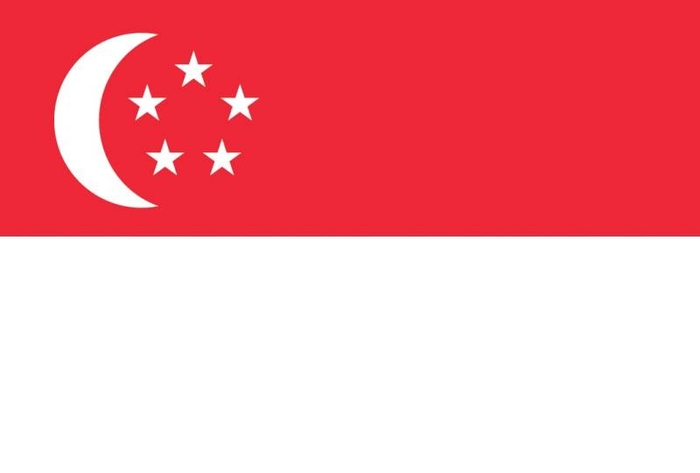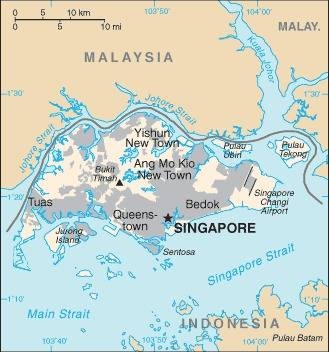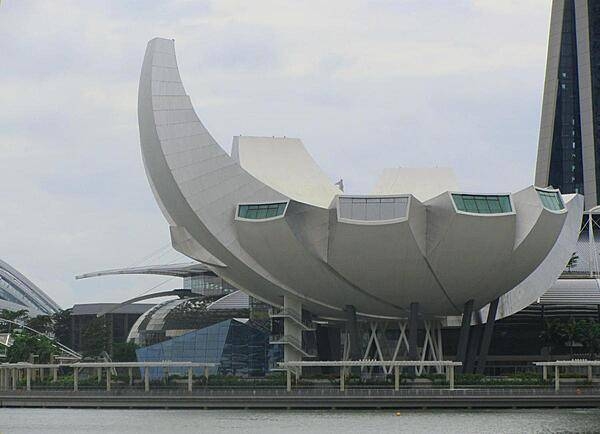163 Singapore

Two equal horizontal bands of red (top) and white. Near the hoist side of the red band, there is a vertical, white crescent (closed portion is toward the hoist side) partially enclosing five white five-pointed stars arranged in a circle. Red denotes brotherhood and equality. White signifies purity and virtue. The waxing crescent moon symbolizes a young nation on the ascendancy. The five stars represent the nation’s ideals of democracy, peace, progress, justice, and equality.
Flag courtesy of the CIA World Factbook

Map courtesy of the CIA World Factbook

The ArtScience Museum on Marina Bay in Singapore resembles a lotus flower. The museum is part of the Marina Bay Sands hotel and casino.
Photo courtesy of the CIA World Factbook
Government
According to Britannica, Singapore is a unitary parliamentary democracy based on the Westminster model. The president is head of state; until 1991 the largely ceremonial post of president was filled by parliamentary election, but in that year the constitution was amended to allow for the direct popular election of the president and for presidential powers to be expanded. The unicameral Parliament consists of 94 members, of whom 84 are elected and 10 are appointed to terms of up to five years. The parliamentary majority selects the prime minister, who is head of government, and the cabinet from its own ranks, and they in turn form the government. In each constituency there is a Citizens’ Consultative Committee, designed to link local communities to the ruling party.
Close liaison is maintained between the political and administrative arms of government. The administrative structure consists of the various ministries and statutory boards. These are staffed by civil servants who are monitored by an independent Public Service Commission.
Justice is administered by the Supreme Court and by courts of lesser jurisdiction, such as district and magistrates’ courts. Appeals can be made from the lower to the higher courts, with final appeal to the Court of Appeals. A Sharīʿah court has jurisdiction in matters of Islamic law.
Civil Aviation Authority of Singapore (CAAS)
The Civil Aviation Authority of Singapore (CAAS) has a mission to “Grow a safe, vibrant air hub and civil aviation system, making a key contribution to Singapore’s success”. CAAS roles are to enable the growth of the air hub and aviation industry, oversee and promote safety in the industry, provide air navigation services, and develop Singapore as a center of excellence for aviation knowledge and human resource development.
Airspace
SkyVector – Google Maps – ADS-B Exchange
ICAO countries publish an Aeronautical Information Publication (AIP). This document is divided into three parts: General (GEN), En Route (ENR) and Aerodromes (AD). ENR 1.4 details the types of airspace classes they chose to adopt from classes A through G.
Drone Regulations
C-UAS
On 31 March 2021, a purpose-built C-UAS Operations Command and Control Centre (OCC) was operationalized.
This augments C-UAS and surveillance capabilities to ensure aviation and public safety.
Advanced Air Mobility (AAM) Regulations & Policies
2025 – Singapore National Aviation Safety Plan 2025-2027
2024 – Aviation Studies Institute – A Future With Autonomous Urban Air Mobility
Bilateral agreements facilitate the reciprocal airworthiness certification of civil aeronautical products imported/exported between two signatory countries. A Bilateral Airworthiness Agreement (BAA) or Bilateral Aviation Safety Agreement (BASA) with Implementation Procedures for Airworthiness (IPA) provides for airworthiness technical cooperation between the FAA and its counterpart civil aviation authorities.
Bilateral Aviation Safety Agreement – Executive Agreement
Implementation Procedures for Airworthiness
Flight Standards Agreements
Maintenance Agreement Guidance (MAG) – Temporary Revision 1
Maintenance Implementation Procedures (MIP) – Revision 1
Obtaining Certification Approval from this Country
Advanced Air Mobility (AAM) News
2025 – CAAS releases safety plan for UTM, AAM integration
2025
Video courtesy of Advanced Air Mobility Institute from the July 2025 Global AAM Forum.
2025 – Asia-Pacific Regulators Issue eVTOL Air Taxi and Drone Guidance
2025 – Japan, Singapore to partner on AAM, strengthen aviation safety
2025 – CAAS seeks feedback on Asia–Pacific drone, air taxi guidelines
2024 – CAAS, JCAB to collaborate on developing UAS, AAM regulations
2024 – Global Sky inks preorder for 15 VoltAero eVTOL aircraft
2024 – Singapore and Supernal Develop Advanced Air Mobility
2023 – Heron AirBridge works to bring AAM operations to Asia-Pacific countries
2023 – Volocopter – The Launch of Urban Air Mobility in Singapore – A ROADMAP
Short Essay Questions
Scenario-Based Question
You have been hired by a Drone Startup Company. Your boss has immediately assigned this job to you.
They need you to prepare a one-page memo detailing the legalities of using a drone to film a regatta in Marina Bay, pictured above.
They need you to mention any national laws and local ordinances.
They specifically want to know what airspace (insert pictures) you will be operating in and whether or not you need an airspace authorization.
Does it matter whether or not you are a citizen of the country?
Lastly, there is a bonus for you if, as you scroll through this chapter, you find any typos or broken links!
Short Essay Questions
- What are the drone categories?
- How is registration addressed?
- How is remote ID addressed?
- What are the model aircraft rules?
- What are the commercial drone rules?
- Are there waivers or exemptions to the rules? If so, for what?
- Would you share a link to an interactive airspace map?
- How is BVLOS addressed?
- How can you fly drones at night?
- How can you fly drones over people?
- Where do you find drone NOTAMs?
- What are the rules for drone maintenance?
- What are the rules for an SMS program?
- What are some unique rules not mentioned above?
- What are the C-UAS rules?
- What are the AAM rules?

